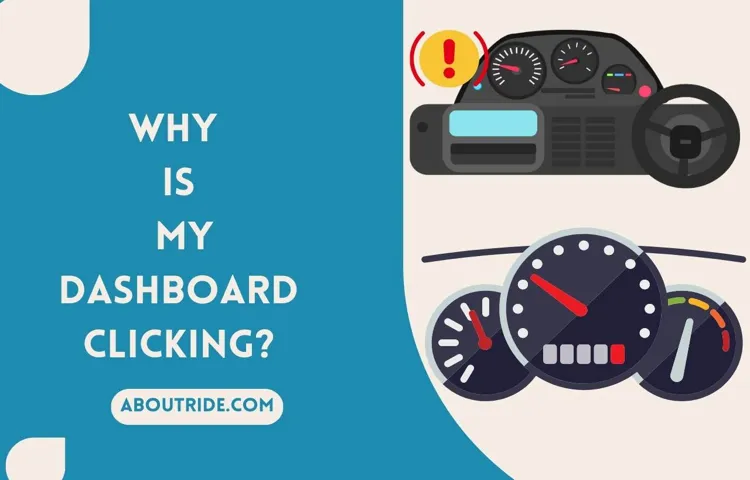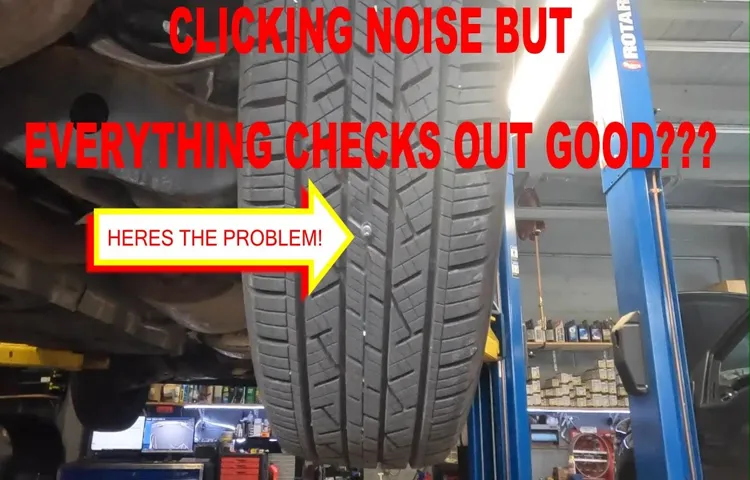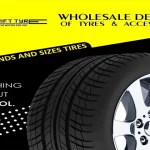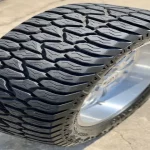Are you hearing an annoying clicking sound coming from your tires while driving? It can be a frustrating experience, but you’re not alone. Many drivers have experienced this issue and wondered what is causing the sound. The truth is that there are several possible causes of tire clicking, each with their unique symptoms and solutions.
In this blog, we’ll explore the various reasons behind tire clicking and what you can do to fix them. So, get ready to learn more about tire maintenance and troubleshooting, and let’s get started!
Table of Contents
Loose Lug Nuts or Wheel Components
If you hear a clicking noise coming from your tire, it could be due to loose lug nuts or other wheel components. When lug nuts are not tightened properly or are missing, the wheel can wobble while driving, causing a clicking sound. Loose wheel bearings can also cause clicking noises, especially when turning.
Any parts of the suspension system, including the tie rods, ball joints, or strut mounts, can make clicking noises if they are worn out or damaged. It is important to have any potential issues with your wheels or suspension system looked at by a professional mechanic to avoid any accidents or further damage. If you suspect your tire is clicking, it is best to get it checked out as soon as possible to ensure your safety on the road.
Description of the Issue
Have you ever experienced a shaky and unstable ride while driving your car? One possible cause of this problem could be loose lug nuts or wheel components. Loose lug nuts can occur due to a number of reasons such as improper installation or over-tightening. If the wheel components that connect the wheel to the car, such as the hub, bearings, or suspension, are loose, it can also cause a wobbly ride.
This issue is not only uncomfortable but also dangerous as it can lead to loss of control over the vehicle or even accidents. It is important to regularly check the tightness of lug nuts and other wheel components and make sure they are secure. In case of any doubts or concerns, it is best to take your car to a professional mechanic who can thoroughly inspect and address any issues.
Don’t take chances with your car’s safety and always prioritize regular maintenance to avoid any potential issues with your car’s wheels.

How to Check and Fix the Issue
One of the most common issues that cause vehicle accidents is loose lug nuts or wheel components. If you hear a vibrating or grinding sound while driving, it is crucial to check your wheels and tires immediately. You can first inspect the lug nuts visually and try to tighten them with a lug wrench if you notice any of them are loose.
However, if the wheel components are not the problem, other issues such as worn-out tires, faulty bearings, or a misaligned suspension could be the cause of the problem. Regularly inspecting your vehicle’s wheels and tires is essential to ensure your safety and prevent any potential accidents. By performing routine checks, you can quickly identify and fix loose lug nuts or wheel components before they lead to catastrophic consequences.
Remember to always double-check your work and never overtighten your lug nuts, as this can also cause damage to your wheels.
Worn or Damaged CV Joint
If you hear a clicking noise coming from your tire, the culprit might be a worn or damaged CV joint. CV joints connect the drive axles to the wheels and can become damaged over time due to wear and tear. When the CV joint is damaged, it causes a clicking noise when turning corners or accelerating.
It’s best to have a mechanic inspect the affected tire as soon as possible, as a damaged CV joint can eventually lead to complete failure and leave you stranded. Replacing a CV joint can be a costly repair, but it’s essential to ensure your vehicle’s safety and performance. So, if you hear a clicking noise, it’s important to address the issue before it turns into a more significant problem.
Description of the Issue
Have you ever noticed an odd clicking or grinding sound coming from your vehicle when you turn? Or felt a noticeable vibration when accelerating or slowing down? These could be signs of a worn or damaged CV joint. A CV joint, or constant velocity joint, is a crucial component in the drivetrain of modern vehicles, responsible for transmitting power from the transmission to the wheels. Over time, the protective boot surrounding the joint can become cracked or torn, allowing dirt and debris to enter and undermine the joint’s integrity.
This can lead to excessive wear and damage, resulting in those tell-tale symptoms. If left unchecked, a damaged CV joint can eventually fail completely, causing the vehicle to become immobilized. To avoid this costly scenario, it’s essential to have your CV joints inspected and replaced if necessary as part of your regular maintenance routine.
By keeping an eye out for warning signs and addressing any issues promptly, you can help ensure your vehicle stays running smoothly and safely.
How to Check and Fix the Issue
If you suspect that your car is making a clicking sound when you turn, or that it’s vibrating more than usual, then it’s possible that the CV joint is worn or damaged. This is particularly common in older cars or those that are frequently driven over rough terrain. To check for CV joint damage, take a look at the rubber boots that surround the joint.
If there are cracks or tears, then dirt and water may have gotten inside and damaged the joint. Another way to test for CV joint damage is to make a sharp turn while driving slowly. If you hear a clicking sound, then this is a telltale sign of a worn or damaged CV joint.
To fix the issue, you’ll need to replace the damaged joint. This can be a difficult and time-consuming job, so it’s best to take your car to a licensed mechanic who can complete the repair and get you back on the road safely. With proper care and attention, your car’s CV joints should last for many years of trouble-free driving.
Uneven Tread Wear
Have you noticed an uneven tread wear on your tires or a clicking sound when driving? One reason why you may experience this is because of a worn-out or damaged CV joint. The CV joint allows your tires to turn and move up and down as your car goes over bumps and uneven terrain. Over time, the joint’s protective boot can crack and expose the joint to dirt and debris, causing it to wear down and create a clicking sound.
Uneven tire wear can also be an indication of a misaligned suspension or wheel balancing issue. It’s vital to have your car checked by a professional mechanic to diagnose the issue and prevent further damage to your vehicle. Neglecting to address these problems can lead to costly repairs and even dangerous driving conditions on the road.
So if you hear a clicking sound or notice uneven tread wear on your tires, don’t hesitate to get your car checked out.
Description of the Issue
Uneven Tread Wear Uneven tread wear is a common issue that affects the lifespan of your vehicle’s tires. This problem is caused by several factors, including improper tire pressure, misalignment, and lack of rotation. When your tires wear unevenly, this could lead to a host of issues such as reduced fuel economy, poor handling, and even safety concerns.
If you notice your car’s steering pulling to one side or your tire treads are not uniform, then it is best to have your vehicle inspected by a professional to determine the root cause of the problem. Neglecting this issue could lead to costly repairs and even endanger your life. So make sure to regularly check your tire pressure, have your wheels properly aligned, and rotate your tires to avoid uneven tread wear.
By doing so, you can ensure a longer lifespan for your tires and a safer driving experience.
How to Check and Fix the Issue
Uneven tread wear is a common issue with tires that can result in poor vehicle performance and safety hazards. To check for uneven tread wear, inspect your tires regularly for uneven or shallow grooves. You can also check the wear bars, which are little raised bars of rubber between the grooves, to see if they are flush with the tread.
If they are, it may be time for new tires. If the tread on one side is more worn down than the other, have your tires rotated to help even out wear. Another potential cause of uneven tread wear is that your wheels may be out of alignment.
This can cause the tires to wear unevenly and make steering more difficult. To fix this issue, take your car to a mechanic to have the wheels realigned. By regularly inspecting your tires and addressing any issues with uneven tread wear, you can increase the life of your tires and improve your vehicle’s safety on the road.
Final Thoughts
If you’ve ever experienced a clicking sound coming from your tires as you drive, you might be wondering what could be causing the problem. Luckily, there are a few possible explanations for this issue. The most likely culprit is that there’s something stuck in the tread of your tire, such as a rock or piece of debris.
This can create a clicking noise as the tire rotates and the object hits the pavement. Another possible cause could be a worn out or damaged wheel bearing, which could create a clicking or grinding noise. It’s important to address these issues as soon as possible, as they could lead to further damage and even potential safety risks on the road.
If you’re not sure what’s causing the clicking sound from your tire, it’s best to take your vehicle to a trusted mechanic who can diagnose and fix the issue.
Conclusion
In conclusion, the clicking sound coming from your tire is like a sneaky little clue left by the tire gods. It’s their way of reminding us that even the seemingly insignificant parts of our cars play a vital role in keeping us on the road. So don’t ignore that clicking sound, give your tire some love and attention.
Because who knows, it might just save your life (and your wallet) in the long run. Happy driving!”
FAQs
What could be causing my tire to make a clicking sound?
There are a number of reasons why your tire could be making a clicking sound. It could be due to worn suspension components, a loose lug nut, or even a stone stuck in the tire tread.
Is it safe to continue driving if my tire is making a clicking sound?
It’s generally not recommended to continue driving with a clicking tire, as it could indicate a serious problem with your vehicle. It’s best to have it checked out by a professional mechanic.
How can I diagnose the source of the clicking noise myself?
You can start by visually inspecting your tire and checking for any obvious signs of damage or foreign objects. You can also try driving slowly in a quiet area and listening for the location of the clicking sound.
Do I need to replace my tire if it’s making a clicking sound?
Not necessarily. If the clicking sound is due to a small foreign object stuck in the tire tread, it can usually be removed without any long-term damage. However, if it’s due to a more serious issue, such as worn suspension components, you may need to replace the tire and/or get necessary repairs.
Can a clicking tire affect my vehicle’s performance?
Yes, a clicking tire can indicate a problem that affects your vehicle’s performance and handling. It’s best to have it checked out as soon as possible to prevent any further damage or safety concerns.
How much will it cost to fix a clicking tire?
The cost to fix a clicking tire will depend on the source of the problem. If it’s a small object stuck in the tire tread, it can usually be removed for free. However, if it’s due to a more serious issue, such as worn suspension components, it could cost several hundred dollars or more to fix.
Can I prevent a clicking tire from happening in the future?
Regular maintenance and inspections can help prevent a clicking tire from happening in the future. Make sure to check your tire pressure, rotate your tires regularly, and have your suspension components checked for wear and tear.



